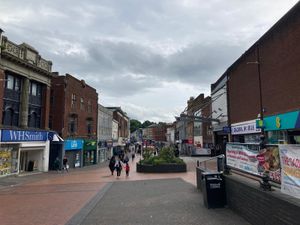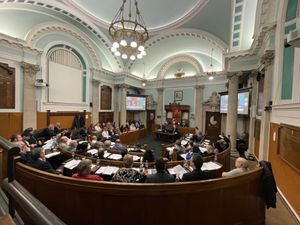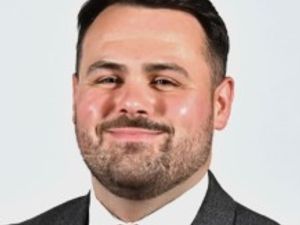'I feel people's pain about knife crime' says PM during visit to Express & Star
The Prime Minister spoke of his anguish as a parent about the murder of Bailey Atkinson when he visited the Express & Star's head office.
Watch more of our videos on ShotsTV.com
and on Freeview 262 or Freely 565
He spoke of his determination to rid the streets of knife crime during an exclusive interview at the newspaper's head office in Wolverhampton – just moments after seven young people were handed life terms for the murder of the 20-year-old in Walsall town centre.
Rishi Sunak said that, as a parent of two young daughters himself, he felt deeply for the families of those affected by knife crime,
He said proposed new laws, introduced to the Commons by Home Secretary in January, would be put into force as a matter of urgency if he were re-elected.
During his visit to the newspaper's head office at Mander House in Wolverhampton, Mr Sunak also spoke about the financial crisis facing local authorities in the region, the victims of the Horizon post office scandal, and how he would address the problem of Severn-Trent Water pouring raw sewage into the River Severn.
Q: One of the biggest concerns of our readers over the past couple of years has been a surge in knife crime, particularly involving children and young people.
At the moment, there is a case going through the courts where two 12-year-olds are accused of a murder using a machete, and within the past hour seven people - including three 17-year-olds have been jailed for the murder of Bailey Atkinson in Walsall. How has it come to this? What are the reasons for this? And, if re-elected, how do you propose to deal with the problem?
A: "It's very sad to hear, I have two young girls who are 11 and 13, and I can understand the pain and an anxiety that parents have about having their kids out and about," said Mr Sunak.
"My job as Prime Minister is to keep everyone safe, first and foremost.
"When it comes to knife crime, the most important thing we are doing is putting more police officers on the street.
"I think we have had 1,200 more police officers here in the West Midlands, as part of the 20,000. The next thing is to give them the powers they need to tackle knife crime, and that means stop-and-search, we're backing them to use that, and it means we have confiscated something like 130,000 knives off our streets in the past few years. The next thing is sentencing, toughening up sentences, which we have done. The sentences for knife crime have increased, and we're introducing new sentences so that people, if they are caught in possession of a knife, the sentences are toughened up.
"And the last thing I would say is making sure that we have good opportunities for young people to do safe enriching things so they are not in gangs. That's why we are investing in more youth clubs across the country, including here. The more we can give young people places to be, where they can be with each other, and be safe to stop them getting into trouble, I think that's what every parent wants to see."
Q. If you are going to impose tougher sentences, you are going to need more prison places. How do you propose to deliver this?
A: "As Chancellor, I authorised the largest prison-building programme in maybe this country's history since the Victorian age. We're in the midst of building 20,000 more prison places, the biggest prison-building programme we've seen, 5,000 of those places have come online. We also now supplement those with something called rapid deployment cells."
Q: This newspaper had campaigned ferociously for a ban on the sale of zombie knives and combat knives, and your government introduced a Bill in January which would have addressed this. Am I correct in my understanding that the dissolution of parliament means this will not now go through? What will you do to take these weapons off the streets?
A: There is a process at the end of a parliament to see which bits of legislation you can get through, it's not always possible for everything to go through, we've made sure the Horizon bill has gone through, to ensure the sub-postmasters get the exoneration they deserve and the compensation they are entitled to. Similarly with infected blood, we've made sure that went through, which I'm pleased about.
"When it comes to knife crime, we're still very committed to all the measures, because what we're doing is going further than what we've done in the past, is to ban more types of knives. as you've been campaigning for rightly. What we are also doing is giving the police more powers, so if they come across knives in the course of what they are doing anyway, they can confiscate them if they think they are going to be used for harm."
Q: So, if re-elected, can you tell us that the laws will be in place by this time next year?
A: "Yes, the Bill is ready, if we are re-elected it will obviously be the priority to make sure we continue to clamp down on this. As a parent first and foremost, I want to make sure that our communities are safe places for our kids."
Q: What would you say to the victims of the Horizon post office scandal, including Rubbina Shaheen, Tracy Felstead and Carl Page, who were wrongly sent to jail?
"I can't imagine what they have been through, described it as the greatest miscarriages of justice that our country has seen, and that's why I'm determined to do everything that I can to right the wrongs of the past, which is why we are passing the Bill to ensure people are exonerated in a blanket fashion, but also making sure that compensation is paid swiftly to everybody, and I think everyone has seen the changes we have made there.
"I can't undo what happened years ago, to everyone and the damage it did to their lives, their livelihoods and their reputations and their families, but what I can do as quickly as possible is get them the answers they deserve, and that's why the inquiry which is ongoing is important. I can get them the compensation they deserve, which is now happening for thousands, and for hundreds of millions of pounds. But then also, I can make sure that their reputations are cleared, which is why their exonerations are so important."
Q: Many of our local councils, including Conservative-run Dudley and Shropshire Councils, are standing on a financial precipice at the moment, making unprecedented cuts to their services to avoid effective bankruptcy. How much longer can this go on for, and what is the solution?
A: "Earlier this year, we provided an extra £600 million for councils up and down the country, and I think on average councils will have 7.5, 8 per cent more to spend per year than they did last year.
"Birmingham Council is a great example of the reality of what it means to have Labour in power, putting up council tax by 21 per cent at a time when the cost of living is a challenge for many families, that is the choice that people face at this election.
"I'm working hard to give people financial security and cut their taxes, we have cut taxes by £900 for an average person in work, Birmingham Council has put them up by 20 per cent and that's what Labour in power means.
"And, more generally, after a difficult few years, we've turned a corner. Inflation is now back to normal, wages have now risen faster than prices for 10 months, energy bills are now falling again today, the economy growing at a healthy rate earlier this year, and that shows that the plan is working, and now we want to build on that economic stability and stick to our clear plan keep taking bold action in future to deliver a secure future for everyone and their families, not just in the West Midlands but across the country.
Q: Last year, some parts of our region saw raw sewage pumped into the River Severn for the equivalent of 120 full days, a third of the entire year. Can this continue, and what would you do to address the matter?
A: "The volume of sewage discharge into our rivers has been unacceptable, that's why we've given the regulator very tough new powers to hold water-company bosses to account, to make sure that none of them are profiting from environmental damage, whether it comes to bonuses or dividend payments, and giving them powers to levy unlimited fines and penalties on water companies which we expect them to use to hold people accountable.
"On top of that, we are now monitoring all storm overflows, which didn't happen in the past, investing record sums into our water infrastructure to improve it."





